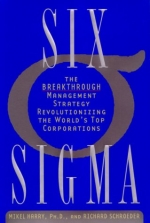Tab Article
Mikel Harry and Richard Schroeder think they've figured out a management program that really works. While at Motorola in the 1980s, they helped pioneer Six Sigma, a process that "guides companies into making fewer mistakes in everything they do--from filling out a purchase order to manufacturing airplane engines." Since then, the two have left Motorola and have turned Six Sigma into a lucrative business that saw over $100 million in consulting contracts in 1998. And now the book.
In Six Sigma: The Breakthrough Management Strategy Revolutionizing the World's Top Corporations, Harry and Schroeder explain Six Sigma and show how it's working at companies such as General Electric, Polaroid, and Allied Signal. The authors contend that most companies today are working at a "sigma" level of between 3.5 and 4, and that with just a one-sigma shift, companies will experience "a 20 percent margin improvement, a 12 to 18 percent increase in capacity, a 12 percent reduction in the number of employees," as well as "a 10 to 30 percent capital reduction." Sigma is a quality metric that counts the number of defects per million opportunities (DPMO). For example, a sigma level of 3.5 means that a process has 22,700 DPMO; a sigma level of 4.5, 1,350 DPMO; and a perfect six sigma, 3 DPMO.
At the heart of Six Sigma is the notion that quality saves money--lots of money. Harry and Schroeder argue that for most companies "the cost of quality is roughly 25 to 40 percent of sales revenue ... at six sigma the cost of quality declines to less than one percent of sales revenue." The idea is not to create quality-assurance programs but to eliminate the need for them altogether. When a company is operating at six sigma, costs that would otherwise go to inspection, rework, warranties, and customer service drop to the bottom line. Six Sigma is a compelling concept that many companies have tied their futures to. Well written, this book is a great introduction for investors, managers, and anyone who sees Six Sigma on the horizon. --Harry C. Edwards


